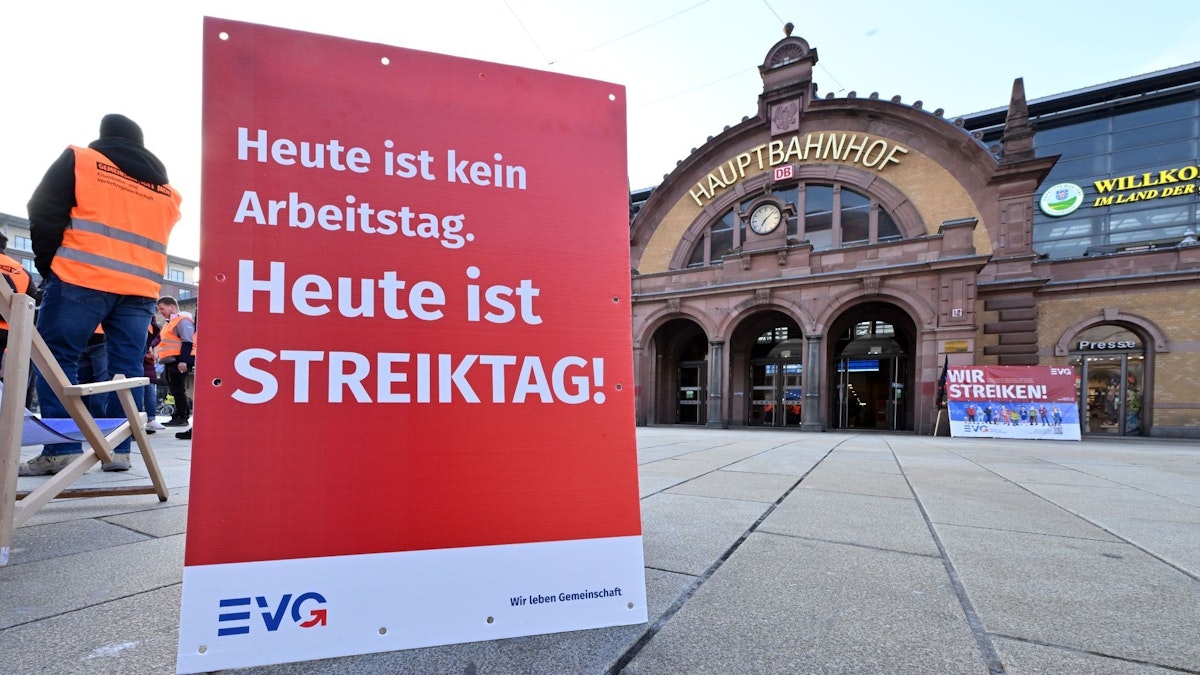Deutsche Bahn still wants to take legal action to prevent the planned 50-hour warning strike on the rails. The state-owned group announced on Saturday morning that it had submitted a corresponding urgent application to the labor court in Frankfurt am Main. The nationwide warning strike by the railway and transport union (EVG) was disproportionate and harmful to customers and uninvolved third parties, it was said to be the reason.
Although the railways have offered more than 10 percent wage increases and have approached the union several times, they are sticking to the walkout from Sunday evening. The urgent application to the court is “now necessary in the interests of the customers,” said the DB. The application was received, confirmed the court of the German Press Agency. The hearing should start on Saturday.
From Sunday, 10 p.m., the EVG called for the third warning strike on the railways this year and will once again paralyze rail traffic. Shortly after the announcement, Deutsche Bahn decided that it would completely stop long-distance traffic for the period of the walkout. In regional and freight traffic, there will probably be hardly any trains between 10 p.m. on Sunday evening and midnight on Tuesday evening.
Strong impact
Since the EVG has also called on employees in signal boxes to walk out, it is likely that railway companies will also be hit that are currently not negotiating with the EVG. The EVG and 50 railway companies have been arguing about new collective agreements since the end of February, and negotiations are stalling.
According to strike researcher Alexander Gallas, the 50-hour strike is the longest warning strike at Deutsche Bahn since its reform in 1994. However, warning strikes lasting one to two days are quite common in other sectors, says Gallas, a scientist at the University of Kassel. “50 hours is a short and clearly defined period. But the effects are very noticeable for the population. That’s why it has a long effect.” Gallas considers the warning strike to be proportionate compared to other industries.
However, according to a survey, every fourth citizen in Germany has “no understanding at all” for the walkout. In contrast, 19 percent of those questioned in the survey by the opinion research institute Yougov on behalf of the German Press Agency showed full understanding for the industrial dispute. In addition, 26 percent said that they “rather understand” for the action in the current wage conflict, also 26 percent have “rather no understanding”. 5 percent of those surveyed did not provide any information.
There is an offer
The EVG is negotiating with the 50 railway companies about new collective agreements for 230,000 employees, 180,000 of whom work for Deutsche Bahn. The EVG asks the industry for 650 euros more per month or 12 percent for the upper income with a term of 12 months. Among other things, Deutsche Bahn has promised tax- and duty-free one-off payments as well as gradual increases of 10 percent for the lower and middle income groups and 8 percent for the upper income groups. There is disagreement about a minimum wage, which has so far only been paid in the form of allowances for around 2,000 employees.
2023-05-14 00:48:14
#Bahn #prevent #warning #strike #urgent #application #court #online


